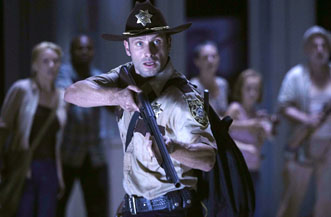|
|
Mythology: Walking Dead Season OneBy Martin FelipeDecember 8, 2010
The end result, however, is that character-based emotional catharsis I speak of. I know I sound like a broken record, but it bears repeating, the most important thing in any story, ANY story, is characters. Lost gets that. The Walking Dead doesn’t. Yet. I was talking to a fellow Walking Dead fan who posited that what’s missing from the show is a Sawyer. I countered that Shane is the show’s Sawyer. She replied that Sawyer is far more complex a character. Thinking this over, I realized that, even six episodes in as Dead is at this point, Lost had already revealed character details which serves to make them multi-dimensional, giving their plights more weight. I stand by my statement that Shane is the most interesting character, but the others are pretty much just dull. Two of the biggest offenders are Merle, who fills the jerk role that every zombie tale must have, and the lead Rick. Perhaps in the second season we’ll start to see layers to Merle that will transform him into a Sawyer-style loveable rogue. Perhaps Rick will start to develop some, you know, flaws, which would make him engaging. Perhaps some of the other characters will actually show some character and make me see them as more than the roles the actors play in other projects. Trust me, the show needs it. Thing is, as it stands, the show is about the constant threat of zombie attacks, and the ethical compromises one must make in order to survive. This is the right direction to take for the show’s longevity, I think. However, as with any story, in order for this to work, we need to start caring for these survivors. Case in point (spoiler), in the finale, some character chooses to die in an explosion rather than escaping to safety. The emotional impact of this is non-existent since we never get to know her as a character, nor do I even remember her name. I could look it up on IMDb, but the thing is, I shouldn’t have to. If the show had done its job, I would know it, I would know her, I would feel the impact of the loss. I know that Frank Darabont and his (fired) writing staff only had a six episode first season for some reason, so there wasn’t much time to really explore these folks. Nevertheless, I repeat, Lost had already laid some character groundwork by this point in its run. I’m willing to give the show a second season chance, however. The details of the writing staff’s firing are murky, but this seems to be a creative choice rather than one of those infamous examples of network meddling, so I’m willing to give Darabont the benefit of the doubt. He gave us Shawshank Redemption, after all, they guy’s earned it. Perhaps an auteurist approach is just what the show needs. My hopes are that he keeps the survivor focus, but takes his time to develop who these survivors are. If the show goes in such a direction, we could be looking at one for the ages. This isn’t to say that I don’t want a little zombie action thrown in there for fun too. Zombies are pretty cool.
|

|
|
|

|
Friday, November 1, 2024
© 2024 Box Office Prophets, a division of One Of Us, Inc.


